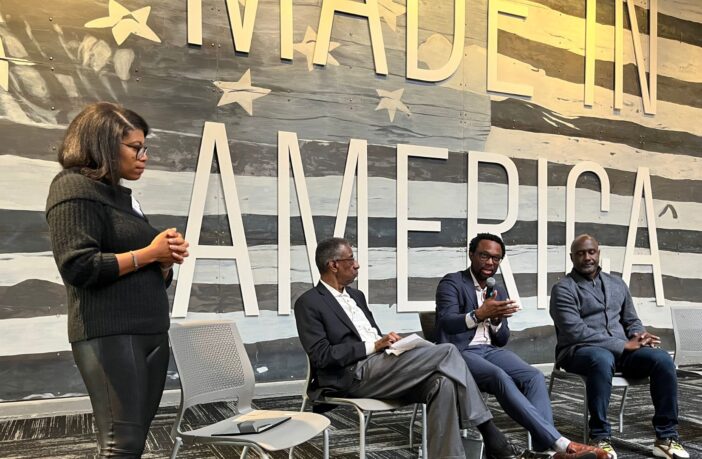By Megan Sayles
AFRO Business Writer
msayles@afro.com
As part of the third annual Baltimore Together Summit, spearheaded by the Baltimore Development Corporation, 10 break-out sessions encompassing community revitalization, workforce development, youth entrepreneurship and support for local small businesses took place across the city from Nov. 13 to 15.
Tech founder Angel St. Jean, left, Stanley W. Tucker, president and CEO of Meridian Management Group; Jay Nwachu, president and CEO of Ignite Capital; and Luke Cooper, founding partner of Latimer Ventures discuss capital access for Black businesses. The panel took place as part of the 2024 Baltimore Together Summit’s break-out sessions.
Credit: AFRO Photo / Megan Sayles
Youth Entrepreneurship
On Nov. 13, director of the Center for Strategic Entrepreneurship at Coppin State University (CSU) Ronald C. Williams hosted a panel on the Excellence in Entrepreneurial Learning (EXCEL) Research Project, a two-year study conducted to improve the ecosystem of support for young entrepreneurs. The project was a direct response to a 2017 Annie E. Casey Foundation report, which examined the employment experiences of local youth and discovered that they have a hunger for business ownership.
“They are our future. I know that’s cliche, but they actually are. When we look at the demographic between ages 16 to 29, they already told us what they want. They crave entrepreneurship, they want it to be equitable and they want to serve their communities,” said Williams. “Now, it’s our job to create opportunities where their desires can be realized.”
At the top of the conversation, Williams emphasized the importance of young people having a “why” behind their business. That “why” can be a passion or a need they detect, but it is also the driving force behind their business development.
CSU senior Mosiah Fit, who sat on the panel, explained that his venture into entrepreneurship was motivated by struggle. He owns Grandma Louise Pies, which sells homemade pizza and pies.
“My grandmother taught me how to make her sweet pies when I was little, but being homeless caused me to tap into my entrepreneurial skills and abilities,” said Fit. “From hardship and learning a family trade, I implemented it. I’ve just been staying consistent with it and it’s been paying off.”
The EXCEL study’s findings included a need for entrepreneurial programs to accommodate participants’ schedules, utilize holistic learning approaches, implement a measurement system to evaluate success and to employ trauma-informed care practices.
Another highlight was the convergence of workforce development and entrepreneurship. Under a number of workforce development programs, participants learn skills that they can leverage when starting a business. Conversely, a business owner can harness entrepreneurial skills to better serve an employer.
However, Williams said the development of these skills hinges on a young person’s ability to learn.
“Some of the themes were the intersection of workforce development and entrepreneurship, the pathways that we are creating for our young people and the importance of being competent learners. Wherever you are along the continuum, part-time entrepreneurship to full-time entrepreneurship, there are certain skills that you need,” said Williams. “Some of those competencies are centered around how good of a learner you are because that will serve you well regardless of the activity.”
Capital Access for Black Small Businesses
On Nov. 14, Angel St. Jean, CEO and cofounder of The Equity Brain Trust, led a panel on capital access for Black business owners. A lack of funding remains one of the top barriers to African-American entrepreneurs.
According to the Federal Reserve’s 2023 Small Business Credit Survey, 32 percent of Black-owned employer firms were approved for a loan, line of credit or merchant cash advance compared to 56 percent of White-owned employer firms. TechCrunch also reported that Black founders received less than 0.5 percent of venture capital funding in 2023.
Tackling funding disparities for Black businesses is especially important in a city, like Baltimore, where nearly 60 percent of the population is African American and 47 percent of the businesses are led by Black entrepreneurs.
“Right now our economic development strategies consist of a one-size-fits-all investment approach that only benefits two demographics, while they, White leaders of industries, hire and promote Black and Brown people into higher-wage jobs unsuccessfully. We can’t expect to grow an economy where 60 percent of the population is underengaged,” said St. Jean. “We need to grow Black- and Brown-owned businesses so their revenues contribute to the coffers and create jobs, and we can hire and promote ourselves.”
Held at City Garage, St. Jean’s panel exclusively comprised local Black capital providers, including Ignite Capital, Latimer Ventures, Meridian Management Group (MMG) and the Harbor Bank of Maryland. Each provides different types of funding.
Stanley W. Tucker, president and CEO of MMG, said his firm personalizes financing for each business depending on their needs and goals.
“We not only bring capital,” said Tucker. “We bring management expertise. We structure the financing based on the situation.”
MMG delivers debt and equity capital, lines of credit and surety bonds. as well as surety bonds, but it also sits down with entrepreneurs to develop a financial strategy for their businesses. The firm only asks that business owners know what their endgame is.
“We want you to do a lot more than survive—we want you to thrive because we want you to be in a position where you can hire other people, particularly people who look like us,” said Tucker.
To watch the full panel conversations, visit the AFRO’s Facebook page and search for the “Baltimore Together Summit” coverage.



